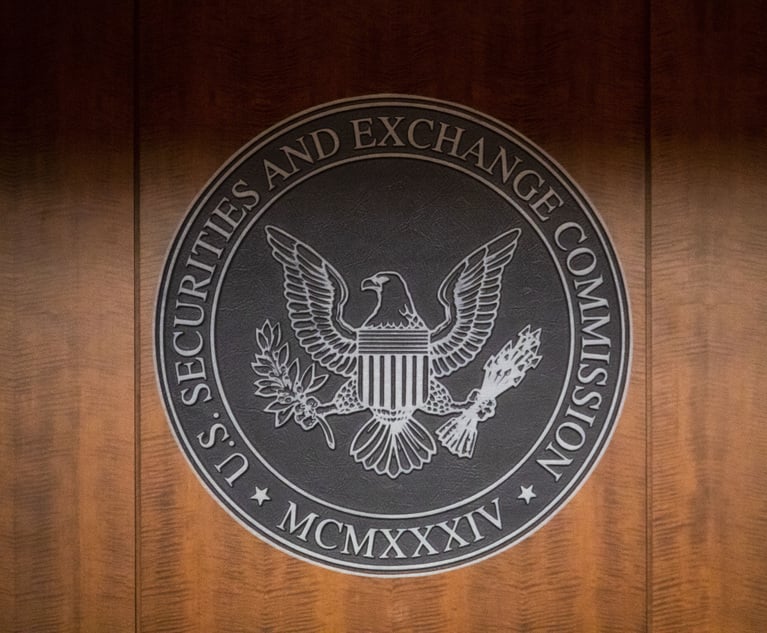Sellers of bonds backed by mortgages and auto loans would haveto give investors details including the borrowers' income andcredit scores under rules the U.S. Securities and ExchangeCommission (SEC) is poised to consider this week, according to twopeople briefed on the plan.
|The SEC will vote Aug. 27 on the final rules, which weremandated by the Dodd-Frank Act after investors were burned bysoured debt sold by Wall Street before the 2008 credit crisis. Thebiggest sellers of asset-backed securities include Bank of AmericaCorp., JPMorgan Chase & Co., Deutsche Bank AG, Citigroup Inc.,and Goldman Sachs Group Inc.
|Securities backed by loans for houses, autos, and commercialreal estate would fall under the rules, which require moreextensive disclosure to bond buyers than the SEC's initial 2010plan, said the people, speaking on condition of anonymity becausethe details aren't public. The agency's move comes amid a surge insubprime auto loans that are being fed into securities, a businessbeing probed by U.S. prosecutors.
|“Prior to the crisis, many investors were not as diligent asthey should have been, and that was part of the problem,” said JeffMahoney, general counsel of the Council of Institutional Investors,whose members include the country's largest public pension funds.“However, they also pointed out that even if they wanted to bediligent, there was not much information they could get.”
|SEC spokeswoman Gina Talamona declined to comment.
|Dodd-Frank required the SEC to improve disclosures about loanspackaged into bonds for investors who had relied on flawed creditratings. The SEC requirements would extend to private sales ofasset-backed securities, which historically have been exempted fromreporting to the agency.
|Bonds backed by student loans or business inventory purchasesaren't included. The SEC plans to complete rules for bonds based onthose assets later, one of the people said.
|Earlier this year, the agency suggested that bond issuers createand maintain restricted electronic repositories for the data. Firmsincluding Deutsche Bank objected, saying they shouldn't beresponsible for policing use of the information underconsumer-privacy laws. The rules indicate that instead, the SECwill provide access to the loan data, the person said.
|Banks and privacy advocates have warned that if the data isn'twell-protected, identity thieves could fish for information tolearn a borrower's identity.
|'Flawed Proposal'
|The SEC will have to monitor the dissemination of data so itisn't obtained by brokers who sell personal information aboutconsumers, said Pam Dixon, executive director of the World PrivacyForum. The regulator also should scotch its original idea ofrequiring that the data include reasons why a borrower fell behindon payments, including whether the person was ill or had gonethrough a divorce, she said.
|“The first proposal was the most flawed proposal we had everseen,” Dixon said. “It's very important this data not become a newsource for unregulated consumer scores about individuals.”
|The new SEC requirements would apply to the $750 billion marketfor private mortgage-backed securities. The private market, whichimploded in 2008, financed just 1 percent of new mortgages in 2013,according to a report last month by Goldman Sachs Group Inc.
|The rules wouldn't affect issuers of government-backed mortgagebonds, including Fannie Mae and Freddie Mac, which dominate themarket. Those sellers provide information that helps investorsjudge borrowers' ability to repay loans. The disclosures includestates of residence, credit scores, and debt-to-income ratio, butthey aren't as extensive as the ones proposed by the SEC.
|Sponsors of securities linked to auto loans haven't discloseddetails of individual loans in the past. Instead, investorstypically received indicators showing the performance and qualityof loans made during different months and years. Outstandingsecuritized auto debt stood at $168 billion through March,according to the Securities Industry and Financial MarketsAssociation.
|Industry groups, including auto-finance firms such as Ford MotorCredit Company LLC and General Motors Financial Company LLC, havepreviously opposed the SEC's call for disclosure of loan-leveldata. “Even though there have been no material changes todisclosure practices specifically for Auto ABS, the Auto ABSmarkets continue to be robust and active,” a group of 17 autolenders including Ford and GM wrote in August 2012.
|In first proposing the rules four years ago, the SEC said itwanted to ensure debt sellers don't avert new disclosure rules byusing the private market. The crisis that followed wide-scalehome-loan defaults threw cold water on the assumption “thatsophisticated investors do not need the types of protections thatcome” with SEC rules, then-SEC Chairman Mary Schapiro said at thetime.
|Copyright 2018 Bloomberg. All rightsreserved. This material may not be published, broadcast, rewritten,or redistributed.
Complete your profile to continue reading and get FREE access to Treasury & Risk, part of your ALM digital membership.
Your access to unlimited Treasury & Risk content isn’t changing.
Once you are an ALM digital member, you’ll receive:
- Critical Treasury & Risk information including in-depth analysis of treasury and finance best practices, case studies with corporate innovators, informative newsletters, educational webcasts and videos, and resources from industry leaders.
- Exclusive discounts on ALM and Treasury & Risk events.
- Access to other award-winning ALM websites including PropertyCasualty360.com and Law.com.
*May exclude premium content
Already have an account? Sign In
© 2024 ALM Global, LLC, All Rights Reserved. Request academic re-use from www.copyright.com. All other uses, submit a request to [email protected]. For more information visit Asset & Logo Licensing.







